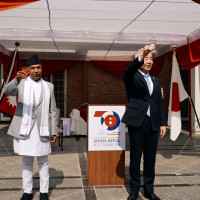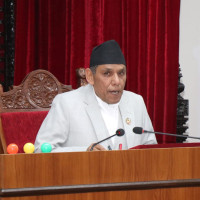- Thursday, 12 February 2026
Women in politics and policy-making positions in Nepal
By Pallav Bhusal,Kathmandu, June 2: Since the first election of the Constituent Assembly in April 2008, which brought 33.2 per cent of women to the forefront of Nepali politics, Nepal has witnessed incredible progress in increasing women's political participation.
The Constitution of Nepal, 2015, is hailed as one of the most progressive in the world concerning gender balance and women’s empowerment. It guarantees 33 per cent of parliamentary seats in both the lower and upper Houses for women and ensures at least one-third of women's representation in the federal parliament and provincial assemblies and 40 per cent in local government.
Nepal has seen several prominent female leaders making their mark in politics and governance. President Bidya Devi Bhandari, the first woman to hold the office of the President of Nepal, has been a symbol of female leadership in the country. Onsari Gharti Magar, the first female Speaker of the House, and Chief Justice Sushila Karki, the first female head of the judiciary, have also broken significant barriers.
Dr. Anjan Shakya, National Assembly member and former Ambassador to Israel from Nepal, has been a vocal advocate for increasing women's representation in governance through networks and communities. Dr. Shakya emphasises the importance of these networks in tackling current inequalities in representation and policymaking. She noted the transformative potential of feminist leadership, which integrates strategies into state policies and practices to promote gender equality and improve women’s access to political participation.
"Networks and communities can directly tackle current inequalities in representation and policymaking," said Dr. Shakya. She highlighted the impact of female participation in politics and policy-making positions on traditional approaches to diplomacy and statecraft, arguing that good policies are essential for establishing gender justice and overcoming discrimination. "The objective of the female inclusive establishment will be achieved only if there is establishment of gender justice, overcoming discrimination," she added.
Dr. Shakya also praised the constitutional provisions that promote women's participation in all decision-making spheres. "The inclusion of provisions in the constitution sends a positive signal promoting women’s participation in all decision-making spheres. It gives positive signals, not only in the country but worldwide as well," she said. Despite these advancements, Dr. Shakya acknowledged the persistent lack of women in key executive positions, which she believes needs to be addressed to achieve sustainable development.
The advancements in female representation have not been limited to political offices. Women’s participation in the civil service and judicial branches has also seen significant increases. However, despite these achievements, there is still a lack of women in key executive positions. Dr. Shakya acknowledged this gap, stating, "Despite Nepal’s commitment to women’s rights and empowerment, there is still a lack of women representation in certain positions. As a consequence, there is a significant lack of women in key executive positions."
Nepal, a country known for its rich cultural heritage and diverse ethnic tapestry, has made significant strides in increasing the political participation of women in recent years.
Constitutional, political, and legal arrangements have enhanced women's representation on various levels of governance. However, a significant gender disparity persists, with men overwhelmingly dominating leadership positions, particularly at the local level. The majority of heads, chairmen, and ward chairs are men.
According to data from the Election Commission of Nepal, the 2022 local and general election results showed that 59.21 per cent of the elected representatives were men, while 40.79 per cent were women.
However, despite this significant representation of women, high-level policy-making positions remain predominantly occupied by men.
Sewa Lamsal, the first female Foreign Secretary of Nepal, has been a prominent figure in advocating for gender-sensitive policies and international commitments to women's rights. Lamsal underscores the historical and progressive transformation in women's representation and participation in governance and policy-making sectors in Nepal. "Feminism is not a new concept in Nepal. More than a word, it is a concept, a movement, a principle that advocates for women’s social, political, legal, and economic rights," she said.
Lamsal highlighted the significant rise in female officers in the Ministry of Foreign Affairs, currently at 25 per cent, as a sign of progress. She emphasised Nepal's commitment to gender equality, as evidenced by the country's ratification of the United Nations Convention on the Elimination of All Forms of Discrimination Against Women (CEDAW) and the increasing proportion of female peacekeepers in UN peacekeeping operations. "We are on the path of inducting the gender perspective of our domestic policies. Nepal has pledged for more gender equality and empowerment of women," Lamsal remarked.
Lamsal also pointed out that Nepal's development plans, policies, and programmes are gender-sensitive, contributing to increased women's representation in decision-making positions across all three branches of government – executive, legislative, and judiciary.
"All these efforts have contributed to women’s representation in decision-making positions of all three branches of executive, legislative, and judiciary. And most importantly, the numbers have been significantly increasing," she said.
Lamsal concurred, noting that while progress has been made, Nepal still has a long way to go to achieve full gender parity. "Nepal still has a long way to go to attain gender parity and win this battle against all forms of gender discrimination, prejudices, and stereotypes," she stated.
Both Dr. Shakya and Lamsal believe that sustained efforts are required to empower and encourage women to take up leadership roles. Dr. Shakya is optimistic about the future, stating, "I anticipate good having in the future about the involvement of women in high-level ranking official positions. For this, women should be encouraged and empowered if the country needs sustainable development."
Lamsal emphasised the importance of fostering peaceful and cooperative policies using gender perspectives, particularly in the context of rising conflicts and geopolitical rivalry. "We should be able to foster more peaceful, harmonised, and cooperative policies using gender perspectives as a logic and lens, particularly in today’s rising conflicts and geopolitical rivalry," she said.
Nepal has made significant progress in increasing women's representation in politics and policymaking positions, thanks to strong constitutional provisions and the efforts of female leaders.
However, the journey towards full gender parity continues, requiring constant commitment and action to overcome persistent challenges and ensure that women have an equal voice in shaping the future of the nation.















